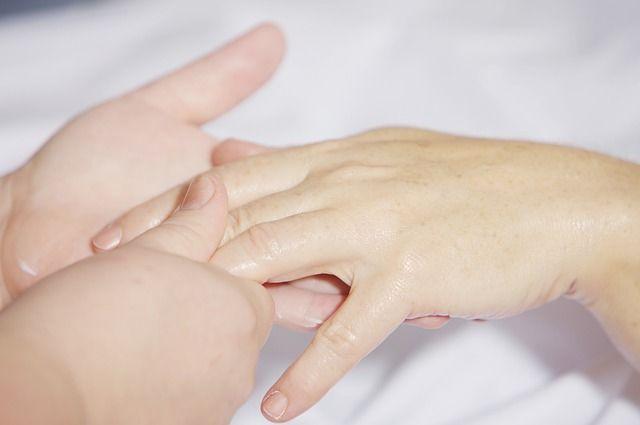The Role of Massage in Managing Pregnancy Stress and Anxiety

Introduction:
Hello and welcome, dear readers! Today, we're here to talk about a topic that is close to the hearts of many expectant mothers - managing pregnancy stress and anxiety. Pregnancy is a beautiful and transformative journey, but it can also bring its fair share of challenges. That's why it's crucial for expecting moms to prioritize self-care, and one powerful tool in their self-care arsenal is massage. In this blog post, we will explore the benefits of massage during pregnancy, safety precautions, techniques for self-massage at home, and other strategies for managing stress and anxiety. So, sit back, relax, and let's dive in!
I. Understanding Pregnancy Stress and Anxiety:
Pregnancy stress and anxiety are common experiences for many women. The physical and emotional changes that come with carrying a baby can sometimes lead to feelings of overwhelm, worry, and even fear. It's important to remember that you are not alone in this journey. Many expectant mothers face similar challenges, and it's okay to acknowledge and address these feelings. The first step towards managing pregnancy stress and anxiety is understanding the causes and symptoms.
The causes of stress and anxiety during pregnancy can vary from woman to woman. Some common factors include hormonal changes, physical discomfort, concerns about labor and delivery, financial worries, and the anticipation of becoming a parent. These stressors can manifest in various ways, such as difficulty sleeping, mood swings, increased heart rate, and even panic attacks. It's essential to recognize these symptoms and take proactive steps towards finding relief.
II. Benefits of Massage During Pregnancy:
Massage therapy can be a game-changer when it comes to managing stress and anxiety during pregnancy. Beyond the immediate sense of relaxation and comfort, prenatal massage offers a host of physical, emotional, and mental benefits for expectant mothers.
Physically, massage helps to alleviate common pregnancy discomforts such as backaches, joint pain, and muscle tension. The gentle kneading and pressure applied during a massage can increase blood circulation, reduce swelling, and promote overall wellness. Additionally, massage can help improve sleep quality, which is often disrupted during pregnancy due to hormonal changes and physical discomfort.
Emotionally, massage provides a nurturing and safe space for expectant mothers to unwind and connect with their bodies and growing babies. The release of endorphins during a massage can uplift mood and promote a sense of calmness. The power of touch in massage can also foster a deep sense of relaxation, helping to alleviate anxiety and promote a positive mindset.
Mentally, massage offers a much-needed break from the demands and stresses of daily life. It allows expectant mothers to focus on themselves and their well-being, promoting a sense of self-care and self-love. By taking time for a massage, pregnant individuals can create a space to recharge and replenish their energy, thus enhancing their ability to cope with stress and anxiety.
III. Safety Precautions:
While massage can be incredibly beneficial during pregnancy, it's crucial to seek professional guidance before receiving a prenatal massage. Not all massage therapists are trained in prenatal massage techniques, so it's essential to find a qualified practitioner who specializes in working with expectant mothers.
Additionally, there are certain contraindications and conditions that may require special considerations when it comes to prenatal massage. These can include high-risk pregnancies, preeclampsia, gestational diabetes, and certain medical conditions. It's important to consult with your healthcare provider before scheduling a prenatal massage to ensure it's safe for you and your baby.
When looking for a qualified prenatal massage therapist, ask for recommendations from your healthcare provider, friends, or fellow moms. Look for therapists who have received specialized training in prenatal massage and can provide a safe and comfortable environment for expectant mothers. Remember, your safety and well-being are of utmost importance.
IV. Techniques for Self-Massage at Home:
While it's wonderful to visit a professional massage therapist, there are also simple self-massage techniques that pregnant individuals can practice at home. These techniques can be incorporated into your daily routine and provide a way to manage stress and anxiety whenever needed.
One technique is the gentle belly massage. Find a comfortable position, such as sitting or lying down, and apply a small amount of oil or lotion to your belly. Using gentle circular motions, massage your belly in a clockwise direction. This can help relieve tension and promote a sense of connection with your baby.
Another technique is the foot massage. During pregnancy, the feet often bear the brunt of the extra weight and swelling. Sit in a comfortable chair and prop your feet up on a pillow. Using your hands or a massage tool, apply gentle pressure and knead the soles of your feet in circular motions. This can help alleviate foot pain and promote relaxation.
You can also try a neck and shoulder massage using a tennis ball. Stand with your back against a wall and place a tennis ball between your shoulder blades. Gently move your body up and down, allowing the ball to massage the muscles in your neck and shoulders. This technique can release tension and ease discomfort in these common problem areas.
Remember, self-massage is not only about the physical benefits but also about creating a sacred space for yourself. Light candles, play soft music, and take this time to fully embrace self-care and relaxation.
V. Other Strategies for Managing Pregnancy Stress and Anxiety:
While massage is a powerful tool, it can be even more effective when combined with other stress-reducing techniques. Consider incorporating mindfulness or breathing exercises into your daily routine to enhance the benefits of massage. Mindfulness involves bringing your attention to the present moment, observing your thoughts and emotions without judgment. Deep breathing exercises can help calm the nervous system and promote relaxation.
Creating a supportive environment is also key to managing stress and anxiety during pregnancy. Engage in activities that promote relaxation, such as taking soothing baths, practicing gentle yoga, or listening to calming music. Surround yourself with positive influences and seek support from loved ones or pregnancy support groups. Remember, you don't have to navigate this journey alone.
Conclusion:
Congratulations, dear readers, on embarking on this beautiful journey of pregnancy! Managing stress and anxiety is an essential aspect of self-care during this transformative period, and massage can be a valuable tool in your self-care toolkit. We've explored the benefits of massage during pregnancy, safety precautions, techniques for self-massage at home, and other strategies for managing stress and anxiety.
Remember, it's okay to prioritize your well-being and take time for yourself. Pregnancy is a time of immense change and growth, both physically and emotionally. By incorporating massage and other stress-reducing techniques into your routine, you are nurturing yourself and your baby. Embrace the power of self-care and let massage be your sanctuary of relaxation and rejuvenation. You deserve it, mama!
FREQUENTLY ASKED QUESTIONS
What are the benefits of massage during pregnancy?
Massage during pregnancy offers numerous benefits for expectant mothers. Here are some of the key advantages:
-
Relieves muscle tension: As the body undergoes changes during pregnancy, muscles can become tense and achy. Massage helps to alleviate this tension, reducing discomfort and promoting relaxation.
-
Reduces swelling: Many pregnant women experience swelling in their hands, feet, and ankles due to increased fluid retention. Massage techniques, such as gentle strokes and lymphatic drainage, can help to reduce swelling and improve circulation.
-
Eases back and joint pain: The added weight and shifts in posture during pregnancy can lead to back pain and joint discomfort. Massage can target these areas, providing relief and helping to improve mobility.
-
Promotes better sleep: Pregnancy can disrupt sleep patterns, making it difficult for expectant mothers to get the rest they need. Massage can help to relax the body and mind, improving sleep quality and duration.
-
Decreases anxiety and stress: Pregnancy can bring about a range of emotions, including anxiety and stress. Massage releases endorphins, which help to reduce feelings of anxiety and promote a sense of well-being.
-
Enhances mood and overall well-being: The nurturing touch of massage can have a positive impact on mood and emotional well-being. It can help pregnant women feel more connected to their bodies and the growing life inside them.
-
Prepares the body for labor: Certain massage techniques, such as prenatal massage, can help prepare the body for labor by improving flexibility, promoting blood flow, and releasing tension in the pelvic area.
-
Provides a time for relaxation and self-care: Pregnancy can be a busy and stressful time, and taking a break for a massage allows expectant mothers to prioritize self-care and focus on their own well-being.
It's important to note that pregnant women should always consult with their healthcare provider before receiving a massage and ensure that they work with a qualified prenatal massage therapist who is trained in pregnancy-specific techniques.
Is massage safe during pregnancy?
Massage can be safe during pregnancy, but it is important to take certain precautions. It is always recommended to consult with your healthcare provider before receiving a massage while pregnant. They will be able to assess your specific situation and provide guidance based on your individual needs.When choosing a massage therapist, it is essential to select someone who is trained and experienced in prenatal massage. Prenatal massage therapists have specialized knowledge and techniques that are specifically tailored to the needs of pregnant women.
During a prenatal massage, the therapist will use gentle, soothing strokes to help alleviate common discomforts associated with pregnancy, such as back pain, swelling, and muscle tension. They will also take into account any specific areas of concern you may have.
It is important to communicate openly with your massage therapist during the session. If you experience any discomfort or if something doesn't feel right, don't hesitate to let the therapist know. They will adjust their techniques to ensure your comfort and safety.
Certain conditions may require you to avoid or modify massage during pregnancy. These conditions include high-risk pregnancies, preeclampsia, preterm labor, severe swelling, and certain medical conditions. Your healthcare provider will be able to advise you on whether massage is appropriate for you.
Overall, massage can be a safe and beneficial way to relax and address common discomforts during pregnancy. However, it is crucial to consult with your healthcare provider and choose a qualified massage therapist who specializes in prenatal massage.
Are there any specific massage techniques used for pregnancy?
Yes, there are specific massage techniques that are commonly used for pregnant women. Prenatal massage, also known as pregnancy massage, focuses on addressing the unique needs and discomforts of expectant mothers.One commonly used technique is Swedish massage, which involves long, sweeping strokes to relax the muscles and improve circulation. This can help reduce swelling and relieve tension in the body.
Another technique is called side-lying positioning, where the pregnant woman lies on her side with pillows for support. This position allows for maximum comfort and safety during the massage, as it avoids putting pressure on the abdomen and other sensitive areas.
Specific areas of focus during prenatal massage include the lower back, hips, and legs, as these are often the areas that experience the most strain during pregnancy. Gentle pressure and kneading techniques are used to relieve tension and promote relaxation.
It's important to note that prenatal massage should only be performed by a trained and certified massage therapist who specializes in working with pregnant women. They have the knowledge and expertise to ensure the safety and comfort of both the mother and the baby.
Before getting a prenatal massage, it's always a good idea to consult with your healthcare provider to ensure that it is safe for you and your baby. They can provide guidance and recommendations based on your individual circumstances.
Overall, prenatal massage can be a wonderful way to support the physical and emotional well-being of expectant mothers. It can help alleviate pregnancy discomforts, reduce stress, and promote a sense of relaxation and connection with the baby.
How often should I get a prenatal massage?
When it comes to prenatal massages, the frequency can vary depending on your individual needs and preferences. In general, it is recommended to have prenatal massages regularly throughout your pregnancy to help manage any discomfort or stress you may be experiencing. Many expectant mothers find that scheduling a prenatal massage once a month is beneficial in promoting relaxation and relieving muscle tension. However, some may choose to have massages more frequently, such as every two weeks, especially if they are experiencing specific pregnancy-related issues like back pain or swelling. It's important to consult with your healthcare provider and a licensed prenatal massage therapist to determine the best frequency for you based on your unique circumstances. They will be able to provide personalized recommendations and ensure that the massage techniques used are safe and suitable for pregnancy. Remember, prenatal massages are a wonderful way to take care of yourself during this special time, so listen to your body and adjust the frequency as needed.




